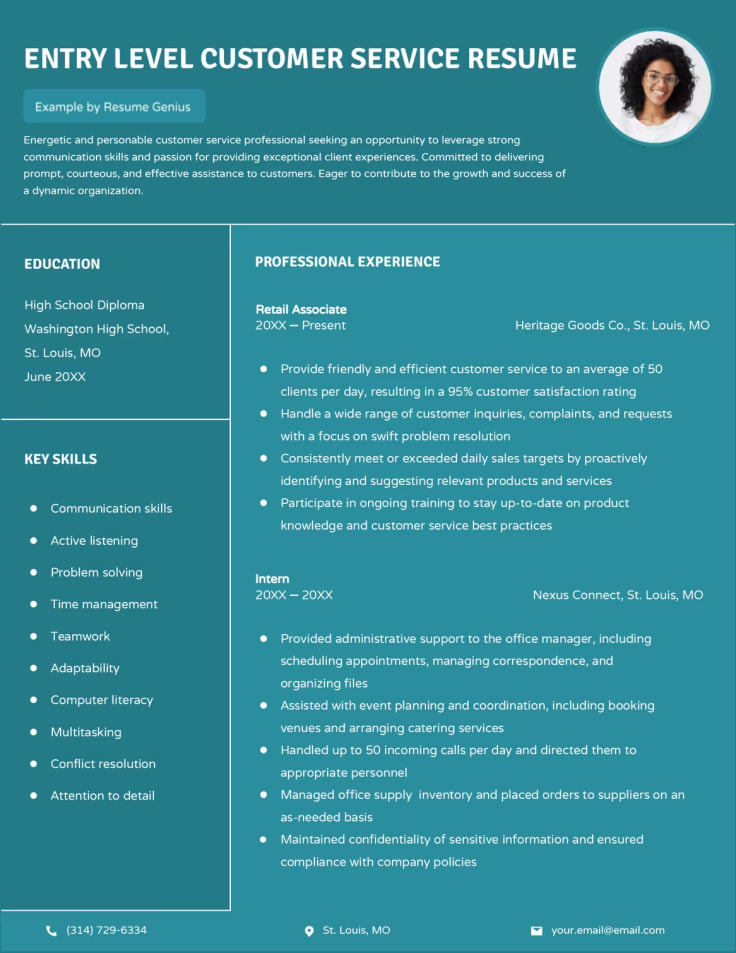Are you gearing up for a customer service interview? What questions might come your way, and how can you answer them?
Customer service interviews gauge your ability to deliver exceptional service, handle challenging situations, and contribute positively to the customer experience.
Let’s explore some customer service interview questions and answers crafted to help you shine in your next interview and secure that role you’ve been eyeing.
Preparing for the interview
Preparation is key to a successful interview, especially when understanding the company and the role you’re applying for.
How do you research the company and the customer service role?
Thoroughly researching the company and the customer service role will help you tailor your answers during the interview and demonstrate your genuine interest in the position.
-
Understand the job requirements: Begin by carefully reading the job posting to learn the specific skills, qualifications, and responsibilities expected for the role. Note any keywords or phrases that indicate what the employer is looking for in a candidate.
-
Explore the company’s website: Visit its official website to gain insights into its mission, values, and culture. Look at the “About Us” section to learn more about the company’s history, leadership, and overall goals.
-
Review products and services: Familiarize yourself with the company’s products or services. Understanding what they offer will allow you to speak more about how you can enhance customer satisfaction.
-
Check social media and news: Follow the company’s accounts and look for recent news articles or press releases.
How do you prepare your resume?
Customizing your resume and cover letter for the customer service role you’re applying for is crucial to making a strong impression.
-
Analyze the job description: Start by closely reviewing the job description and noting the qualifications, skills, and experience required. Use these insights to tailor your resume and cover letter, ensuring that you highlight your relevant strengths and how they align with the role.
-
Use keywords: Incorporate relevant keywords from the job description into your resume and cover letter. Many companies use applicant tracking systems (ATS) to screen applications, so including the right keywords can help your application get noticed.
-
Focus on customer service experience: On your resume, emphasize your previous customer service roles, detailing your responsibilities and the impact you had. Use bullet points to outline achievements such as improved customer satisfaction ratings, successful problem resolutions, or efficient handling of high call volumes.
Showcase transferable skills: Even if your experience isn’t directly in customer service, highlight transferable skills such as communication, problem-solving, and teamwork. Use specific examples to demonstrate how these skills have been applied in previous roles.
How do you practice your interview skills?
Practicing your interview skills is essential for building confidence and ensuring you’re prepared to answer questions.
-
Identify common questions: Review common customer service interview questions, such as those related to handling demanding customers, resolving conflicts, or demonstrating teamwork. Use the questions provided in this blog post as a guide.
-
Prepare and rehearse answers: Write out answers to these questions, focusing on how your experience and skills align with what the interviewer might be looking for. Rehearse your responses out loud to get comfortable with the wording and delivery. This will help you speak confidently and clearly during the actual interview.
Use the STAR method to structure your answers
The STAR (Situation, Task, Action, Result) method is a proven technique for structuring your responses to behavioral interview questions, which is common in customer service interviews.
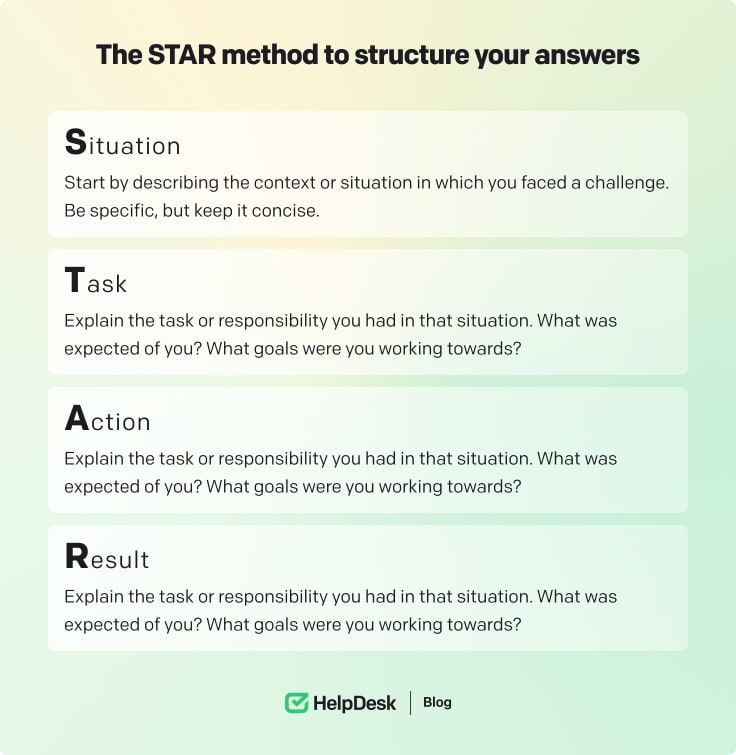
Example using the STAR Method
-
Situation: “In my previous role, I encountered a situation where a long-term customer was unhappy with a delayed shipment.”
-
Task: “My responsibility was to resolve the issue quickly while ensuring the customer remained satisfied with our service.”
-
Action: “I immediately apologized to the customer for the inconvenience, investigated the cause of the delay, and expedited the shipment. As a goodwill gesture, I also gave the customer a discount on their next purchase.”
-
Result: “The customer appreciated the quick resolution and continued to do business with us, even leaving a positive review online about how the situation was handled.”
What can you expect in a customer service interview?
When stepping into a customer service interview, be ready to face various questions designed to evaluate your suitability for the role.
Behavioral questions
Behavioral questions are designed to understand how you’ve handled situations in the past. They often begin with phrases like “Tell me about a time when…” or “Give an example of…” The purpose is to assess your past behavior as an indicator of future performance.
For instance, you might be asked to describe when you dealt with a demanding customer or resolved a complaint. The interviewer seeks evidence of your problem-solving abilities, communication skills, and how you manage stress or conflict.
Situational questions
Situational questions present hypothetical scenarios to see how you would handle certain situations. These questions assess your ability to think on your feet and apply your knowledge and skills in real time.
They often involve challenging customer interactions, such as dealing with an angry customer or managing a service failure. The goal is to gauge your decision-making process, ability to remain calm under pressure, and customer-first mindset.
Skills-based questions
Skills-based questions focus on the specific competencies required for the role. These include your ability to use customer service software, handle multiple inquiries at once, or communicate effectively in various mediums (phone, email, chat). These questions determine whether you have the technical and interpersonal skills to perform the job well.
Learn more about skills that every support agent should have. Read our guide. 📚
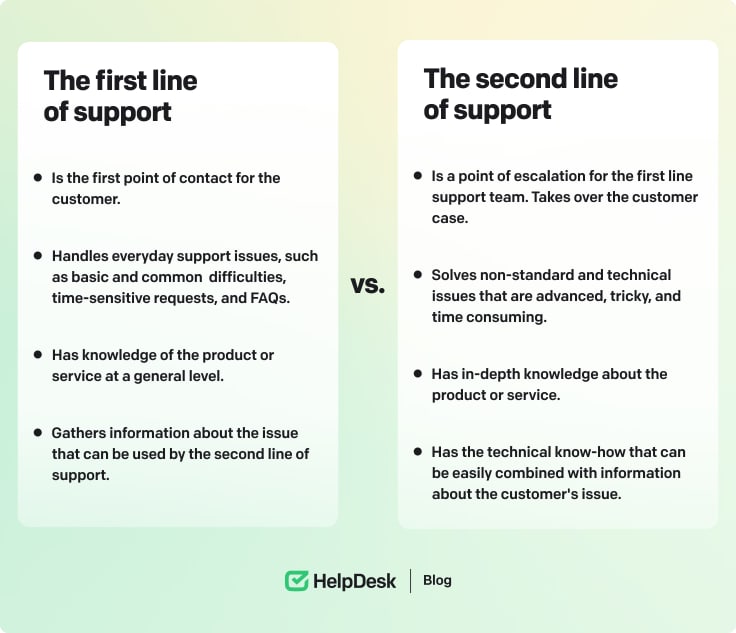
Experience and background questions
The interviewer will likely ask about your previous work experience, education, and career aspirations. They want to understand your background and how it aligns with the role you’re applying for. Questions in this category include inquiries about your previous positions, the types of customers you’ve worked with, and how your past experiences have prepared you for this role.
Goal-oriented questions
Finally, expect questions about your career goals and how this role fits into your professional plans. Interviewers want to know that you’re not just looking for a job but see this position as a step toward achieving your long-term goals.
It helps them assess your commitment and whether you’ll likely stay with the company. Be ready to provide specific examples of your customer service experience and highlight the skills that make you a strong candidate.
Tips for acing a customer service interview
To stand out in a customer service job interview, consider the following tips:
-
Research the company and role: Before the interview, learn about the company and the specific customer service role you’re applying for. Understand the company’s values, approach to customer service, and expectations for the position.
-
Practice communication skills: Excellent communication is at the heart of customer service. Practice articulating your thoughts clearly and concisely. Engage in active listening, which means genuinely hearing what the interviewer is asking and responding thoughtfully. Good communication also involves being polite, patient, and professional.
-
Prepare questions to ask: Interviews are a two-way street. Prepare insightful questions to ask the interviewer about the company culture, team dynamics, or growth opportunities within the role. Asking questions shows that you’re engaged and serious about the position.
-
Highlight adaptability and problem-solving skills: Customer service roles often require you to think on your feet and adapt to new situations quickly. Be ready to share examples of how you’ve successfully navigated challenges, showcasing your ability to stay calm under pressure.
-
Showcase a positive attitude: During the interview, demonstrate your enthusiasm for the role and willingness to go the extra mile to ensure customer satisfaction. Employers value skilled candidates who bring a positive, can-do attitude to the team.

Understanding the customer service role
When preparing for a customer service rep interview, you should understand what the role entails and what is expected from someone in this position. Here are some common questions and how to approach them:
1. What does excellent customer service mean to you?
When asked about your definition of excellent customer service, convey your understanding of what makes a customer experience outstanding. Great customer service goes beyond simply meeting the customer’s needs. It’s about creating a positive, memorable interaction that fosters customer loyalty.
-
Responsiveness: Quickly address customer inquiries and concerns to show that their needs are prioritized.
-
Empathy: Understanding and acknowledging customer’s feelings and perspectives helps build a strong rapport.
-
Proactivity: Anticipating customer needs and offering proactive support before issues escalate.
Example answer: “To me, great customer service means going above and beyond to ensure that every customer feels valued and heard. It involves being responsive to their needs, empathetic to their concerns, and quick in finding solutions.”
Discover the power of proactive support with the HelpDesk blog article. 🔥
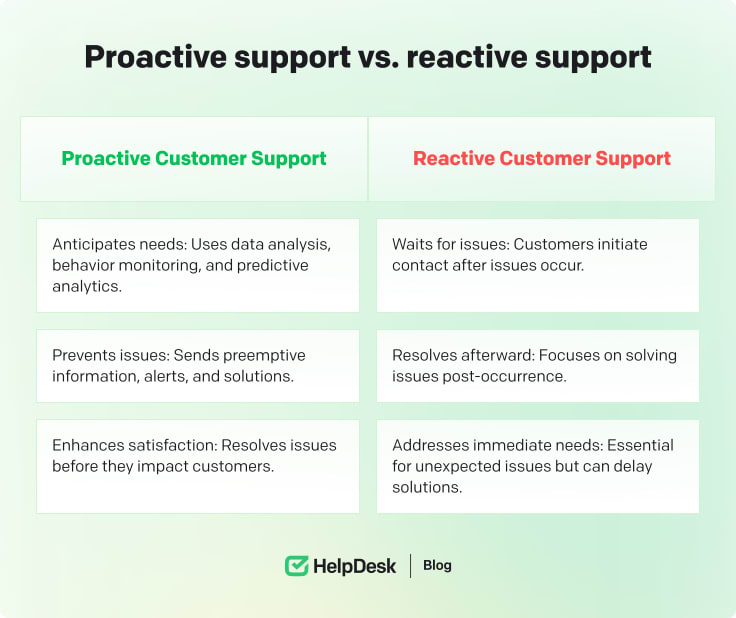
2. Why do you want to work as a customer service representative?
Interviewers often ask this question to gauge your motivation for pursuing a role in customer service and to see if your values align with the job. When answering, focus on your passion for helping others and the skills that make you an excellent fit for the role:
-
Helping others: Express your enjoyment of assisting people and resolving their issues, which is at the heart of customer service.
-
Strong communication: Highlight your ability to communicate perfectly, which is necessary for understanding customer needs and conveying information.
-
Thriving in fast-paced environments: Emphasize your comfort in dynamic settings where you can adapt quickly and stay organized.
Example answer: “I want to work as a customer service representative because I genuinely enjoy helping others and find satisfaction in resolving issues. I am a strong communicator and can quickly understand customers’ needs. Also, I can use my problem-solving skills to ensure customers leave with a positive experience.”
Behavioral interview questions
Behavioral interview questions assess your past interactions, which can give the interviewer insight into how you might handle similar situations. You can easily approach some common behavioral questions for customer service representatives.
3. How do you handle stressful situations?
Handling stressful situations is crucial; you must stay calm, focus on solutions, and manage your time.
Example answer: “I handle stressful situations by taking a moment to breathe deeply and remain calm. I assess the situation to understand the problem and develop a structured plan. For instance, during a hectic shift, I prioritized tasks based on urgency and worked efficiently to manage multiple customer issues at once. Focusing on one step at a time and keeping a clear mind, I could resolve the issues effectively and maintain a positive customer experience.”
4. How do you prioritize your work?
Prioritization is a must for managing workload and meeting deadlines. It involves distinguishing between urgent tasks and using organizational tools to stay on track. Here’s a refined response:
Example answer: “I prioritize my work by understanding the urgency and importance of each task. I start by identifying tasks with immediate deadlines or significant impact and focus on completing those first. To stay organized, I use tools like to-do lists and digital calendars to track my tasks and deadlines. For instance, I once had multiple projects with overlapping deadlines, so I created a priority list, tackled the high-priority tasks first, and then worked on the ones with the least priority.”
Having trouble with prioritizing tasks? Our guide is here to help you! Check out Plan Your Support Team's Work Like a Pro. 👏
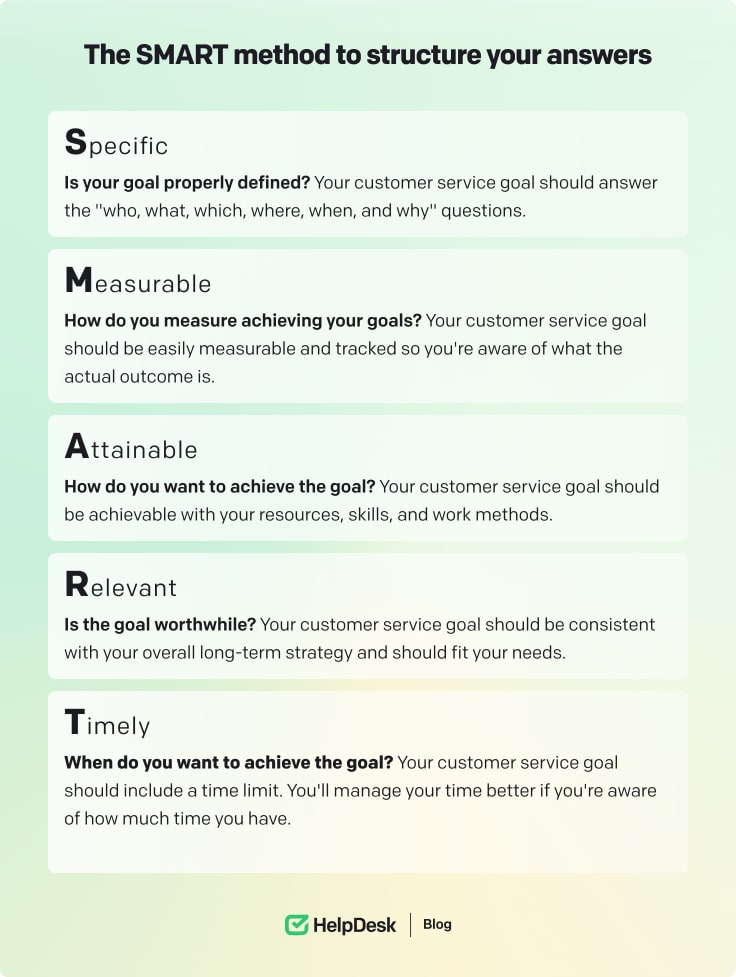
5. Can you describe a time when you provided good customer service?
Describing a specific instance where you provided excellent customer service helps demonstrate your ability to apply your skills in real-world scenarios.
Example answer: “Certainly! There was a situation where a customer was frustrated because their order was delayed. I listened carefully to their concerns and apologized for the inconvenience. I then investigated the issue and provided them with an updated delivery timeline. I also offered a gesture of goodwill discount on their next purchase. After resolving the issue, I followed up with the customer to ensure they were satisfied with the resolution. They appreciated the prompt and attentive service, which resulted in positive feedback for our team.”
Situational interview questions
Situational interview questions are designed to evaluate how you might handle hypothetical scenarios relevant to the job.
6. How would you respond to a customer complaint?
Responding quickly to customer complaints is necessary for maintaining customer satisfaction and loyalty. The key is to approach the situation with empathy and a solution-oriented mindset.
Example answer: “I would start by actively listening to the customer’s complaint and acknowledging their frustration. I aim to understand the issue thoroughly and apologize for any inconvenience they have experienced. I would then work to find a suitable solution, whether offering a refund, providing a replacement, or escalating the issue to a higher level if necessary.”
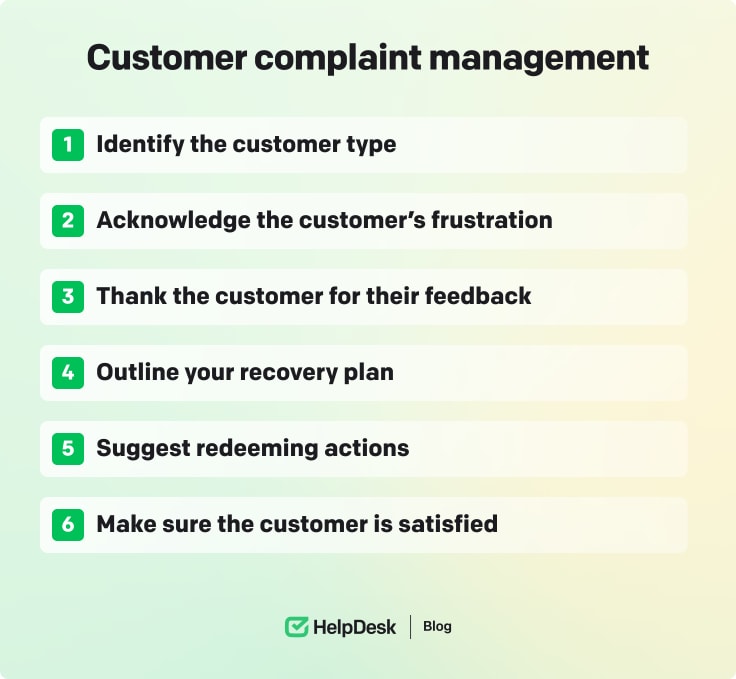
7. What would you do if you didn’t know the answer to a customer’s question?
When you don’t have an immediate answer, it’s crucial to be honest and willing to find the correct information.
Example answer: “If I didn’t know the answer to a customer’s question, I would honestly admit that I don’t have the information at the moment but assure them that I will find out. I would then promptly seek the information from a reliable source or consult a colleague who might have the answer. Once I have the correct information, I will follow up with the customer as soon as possible to provide the answer and ensure they’re satisfied with the response. Transparency and follow-through are key in building trust with the customer.”
8. How would you handle a difficult or angry customer?
Handling difficult or angry customers requires a calm demeanor and strong interpersonal skills. The aim is to de-escalate the situation and address the customer’s concerns.
Example answer: “I would approach a difficult or angry customer by remaining calm and professional, regardless of the situation. I would listen carefully to their concerns, allowing them to express their frustration without interruption. I would empathize with their feelings and reassure them that I am there to help. After understanding their issue, I would provide a solution or take steps to resolve it. My focus would be on turning a negative experience into a positive one by addressing their needs and ensuring they leave feeling valued and heard.”
Skills and experience
Your skills and previous experience significantly demonstrate your capability for the customer service team position.
9. What skills do you possess that will help you excel in this customer service position?
When discussing your skills, it’s important to highlight those directly relevant to the customer service role. Focus on abilities that show you can handle the job’s demands and deliver exceptional service.
Example answer: “I possess an excellent communication style, which will enable me to understand and address customer needs effectively. My problem-solving abilities allow me to identify issues and provide solutions that satisfy customers quickly.”
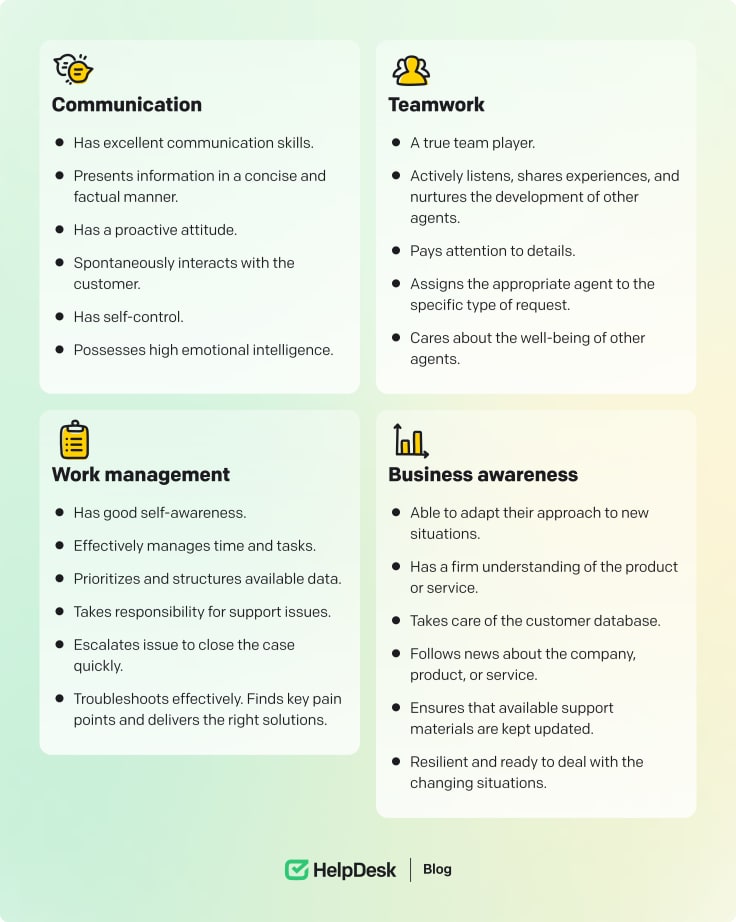
10. Can you tell me about your previous customer service experience?
Your experience shows you have the practical knowledge needed for the role. Be specific about the responsibilities you had and the impact you made in your previous positions.
Example answer: “I have previous experience working in a customer service role, where I was responsible for handling customer inquiries, resolving complaints, and ensuring customer satisfaction. For example, I regularly dealt with issues such as delayed shipments or product misunderstandings and took steps to resolve these problems quickly.”
11. How do you stay motivated in a customer-facing role?
Staying motivated and preventing burnout in a customer-facing role is essential for high performance and job satisfaction. Your answer should reflect your passion for helping others and dedication to delivering excellent service.
Example answer: “I stay motivated by focusing on the positive impact I can have on customers’ lives. Helping others and resolving their issues gives me a sense of fulfillment, and knowing that I’ve made someone’s day a little easier keeps me energized. I also find motivation in the role’s challenges, as they provide opportunities to learn and grow professionally while continuously improving my service.”
Teamwork and leadership
How you interact with colleagues and handle team challenges helps create a supportive and efficient work environment.
12. Are you a team player?
Being a team player is critical in customer service, where collaboration often leads to better problem-solving and overall service quality. Emphasize your ability to work well with others and contribute positively to team dynamics.
Example answer: “I am a team player and thrive in collaborative environments where everyone works together to achieve a common goal. I also make it a point to share ideas, provide constructive feedback, and listen to my colleagues. Whether brainstorming solutions to a customer issue or helping a teammate with a task, I enjoy contributing to a positive and productive team atmosphere.”
13. Can you describe when you worked with a difficult team member?
Working with difficult team members is common, and it’s important to handle these situations professionally. Focus on how you communicated and worked toward a resolution.
Example answer: “I once worked with a team member who had a different approach to problem-solving, which led to some friction within the team. To address this, I tried to communicate more openly and find common ground. Instead of focusing on our differences, I suggested we combine our strengths to tackle the issue.”
14. How do you manage conflict or disagreements with colleagues?
Managing conflict in the workplace requires a calm and diplomatic approach. Highlight your ability to address disagreements constructively and maintain a positive working relationship.
Example answer: “I manage conflict or disagreements by focusing on clear and respectful communication. When disagreements arise, I prioritize listening to the other person’s perspective and understanding their concerns. From there, I work to find common ground or a compromise that aligns with our shared goals. For example, suppose there’s a difference in opinion on how to handle a customer issue. In that case, I suggest a discussion where each person can voice their ideas and collaboratively decide on the best course of action. By keeping the focus on the issue rather than personal differences, I’ve found that conflicts can be resolved more effectively, leading to better teamwork and outcomes.”
Problem-solving and adaptability
Problem-solving skills and adaptability are necessary as unexpected situations often arise and creative solutions are required.
15. Can you give an example of when you had to think creatively to solve a problem?
Creative thinking is valuable in customer service, especially when standard solutions don’t work. When answering this question, highlight your ability to approach problems from different angles and find innovative solutions.
Example answer: “I encountered a situation where a customer was unhappy with a product, and the usual solution of offering a replacement wasn’t sufficient to address their concerns. I had to think creatively, so I brainstormed various options and considered the customer’s perspective. After some thought, I offered them a personalized solution that included a replacement and a complimentary upgrade to a related product. This approach resolved the issue and turned a potentially negative experience into a positive one, leaving the customer highly satisfied.”
16. How do you handle changes or unexpected situations in the workplace?
Adaptability and clear communication are needed in a world where change is often inevitable. Emphasize your ability to remain calm and adjust your approach to maintain productivity.
Example answer: “I handle changes or unexpected situations by staying flexible and adaptable. For example, if a sudden shift in workload occurs or a new procedure is introduced, I quickly assess the situation and prioritize my tasks accordingly. I make it a point to manage my time effectively, ensuring I can meet deadlines even when circumstances change. By staying calm and open-minded, I can navigate unexpected challenges while maintaining a high level of service for customers.”
Become an even greater customer support agent with HelpDesk. Take care of your customers with the highest level of commitment. 🤝
Role-specific questions
Role-specific questions help interviewers determine how well you understand the particular job and company you’re applying for.
17. What do you know about our company and this customer service role?
Demonstrating knowledge about the company and the specific role shows that you’ve done your homework and are genuinely interested in the position. It also reflects your proactive approach.
Example answer: “I researched your company and the customer service role to understand the job requirements and the company’s values. Your company strongly emphasizes customer satisfaction and innovation, which aligns with my values. I’m particularly impressed by your commitment to continuous improvement and how you incorporate customer feedback into your processes. I’m excited to contribute to a team that prioritizes excellence in customer service and is dedicated to making a positive impact.”
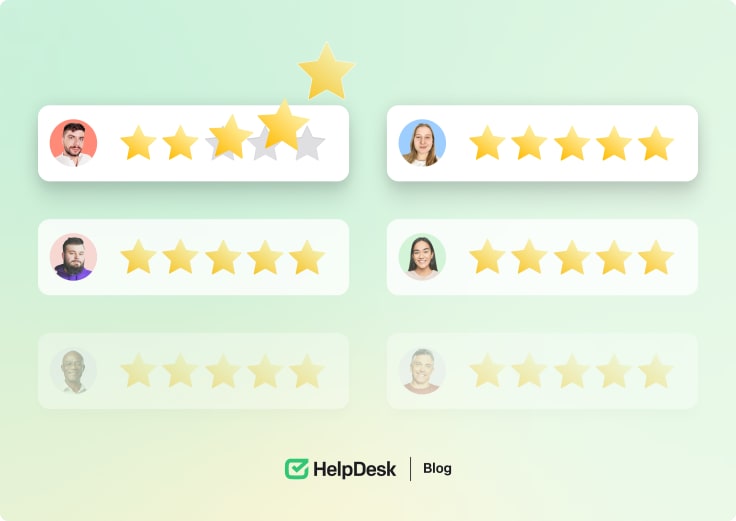
18. How would you measure your team’s success in this role?
Measuring customer service success ensures your team meets its goals and delivers high-quality service. Your answer should focus on critical metrics and regular assessments.
Example answer: “I would measure the success of my team by tracking key performance indicators (KPIs) such as customer satisfaction scores, resolution rates, and average response times. These metrics provide valuable insights into how we’re meeting customer needs. Also, I believe in regular team meetings to discuss our progress, share best practices, and provide feedback. We can continuously improve our performance by combining data-driven assessments with open communication.”
Final questions and next steps
The final stage of an interview often includes questions from the candidate and discussions about what comes next in the hiring process. These questions are an excellent opportunity to demonstrate your interest in the role and clarify any remaining uncertainties.
19. Do you have any questions for me?
Asking thoughtful questions at the end of an interview shows your engagement and helps you gather more information about the company and the role. Focus on aspects like company culture, team dynamics, or growth opportunities.
Example answer: “Yes, I do have a few questions. Could you tell me more about the company culture and how the customer service team collaborates to achieve its goals? I’m also interested in knowing the team’s professional development opportunities. I’m excited about contributing to such a dynamic environment and would love to know more about how I can grow with the company.”
20. What are the next steps in the interview process?
Understanding the next steps in the process helps you prepare for what’s to come and shows that you’re serious about moving forward.
Example answer: “Could you outline the next steps in the interview process? I’m eager to continue the process and learn more about the skills assessment and the opportunity to meet with the team.”
21. What is the timeline for filling this customer service position?
Asking about the timeline gives you an idea of when you might expect to hear back, allowing you to plan accordingly. It also signals your eagerness to start the role.
Example answer: “Can you estimate the timeline for filling this customer service position?”
Other questions you can be asked during the interview
Behavioral questions:
-
Describe a time when you turned a dissatisfied customer into a satisfied one. What steps did you take?
- Purpose: Evaluates your problem-solving skills and ability to handle challenging situations.
-
Can you explain how you handled a high-pressure situation at work?
- Purpose: Assesses your stress management and composure under pressure.
Situational questions:
-
How would you handle a situation where you don’t know the answer to a customer’s question?
- Purpose: Tests your resourcefulness and ability to seek solutions.
-
How would you address the issue if a customer is angry about your mistake?
- Purpose: Evaluates accountability and conflict resolution skills.
Skill-based questions:
-
How do you ensure clear communication when explaining complex information to customers?
- Purpose: Assesses your communication skills and ability to simplify complex concepts.
-
What strategies do you use to manage your time effectively during busy periods?
- Purpose: Evaluates your time management and organizational abilities.
Company-specific questions:
-
What do you know about our company’s products or services?
- Purpose: Demonstrates your research and genuine interest in the company.
-
How do you align your customer service approach with our company’s values?
- Purpose: Assesses cultural fit and understanding of the company’s mission.
Technical questions:
-
What customer service software are you familiar with, and how have you used it in previous roles?
- Purpose: Evaluates your technical proficiency and adaptability to new tools.
-
Can you describe a time when you used data to improve customer satisfaction?
- Purpose: Assesses your analytical skills and focus on continuous improvement.
Summary
Preparing for a customer service interview involves more than just mastering common questions — it’s about showcasing your skills and understanding how modern tools can enhance service delivery.
Familiarize yourself with the top customer service interview questions and answers, and you’ll be well-prepared to highlight your strengths to potential employers and demonstrate your suitability for the role.
Tools like HelpDesk support excellent customer service. With features like ticket management, issue resolution, and automation, HelpDesk helps streamline operations and efficiently handles customer inquiries.
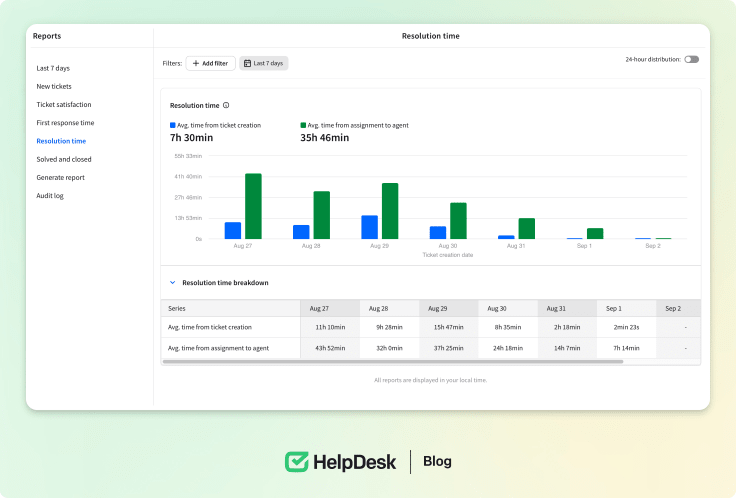
The software supports asynchronous communication, allowing interactions through email, chat, contact forms, or social media, which helps maintain clear and transparent communication with customers.
Including feedback collection features allows businesses to gather valuable insights, improving their products and services based on customer needs. By integrating such tools, you improve your ability to manage and resolve issues and demonstrate a forward-thinking approach to using technology to enhance customer satisfaction.
As you prepare for your interview, remember that excelling in customer service involves combining excellent communication skills with understanding how to utilize resources like HelpDesk to deliver outstanding support.
Emphasize your readiness to contribute to a team that values personal skills and technological efficiency, and you’ll stand out as a candidate ready to make a difference.

